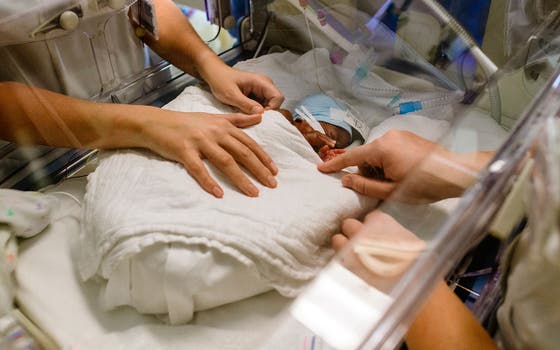AI forecasts outcomes in very premature babies

Researchers at UMC Utrecht have developed an AI model to predict long-term outcome in extremely premature babies early in life. The model can identify which infants might face intellectual disability as they grow. When further developed, it could offer crucial insights for healthcare providers as well as valuable information for parents about their child’s expected developmental journey. The results of the study have been published in The Lancet Digital Health.
Lees artikel in het Nederlands >
Though much progress has been made in neonatal care, infants born before 28 weeks still show a very high risk for long-term difficulties with cognition and movement. Predicting these potential issues early is vital, allowing healthcare providers to tailor support right from the start. The new study marks a crucial step towards developing a tool for early detection that, in the future, could guide parents and medical teams to support vulnerable infants more effectively.
Analyzing brain activity
In essence, the AI model the researchers created was able to identify with reasonable accuracy which infants might struggle with intellectual disability later in childhood. The model analyzed recordings of the brain’s electrical activity, called EEGs, of 369 infants in the first three days after birth. It was able to distinguish between infants that turned out to have a low IQ and those with optimal outcomes at early school age, with an accuracy of approximately 80 percent. “This kind of knowledge is invaluable”, said neonatologist Maria Luisa Tataranno. “It means that extra help, resources, and care can be directed where they are most needed, right from the earliest days.”
A glimpse into the future of extremely premature babies will not only help doctors make the right choices. It will also offer parents of premature babies valuable information. These parents often struggle with uncertainty about their child's future. “The question they ask us most often is ‘What can we expect?’, says Maria Luisa. “An accurate prediction could ease their worries or help them prepare for what lies ahead.” She cautions that much work remains to be done to actually get such a tool to the hospital bedside, though.
Making better predictions
The UMC Utrecht team wants to continue working to improve the AI model in the coming years. “EEG is just the beginning”, notes Xiaowan Wang, a PhD student in biomedical engineering and the first author of the paper. "We plan to incorporate more types of medical data such as MRI scans of the brain, as well as data about blood oxygenation and possibly even babies’ movement patterns, to further refine our predictions.” The goal is to create a comprehensive and accurate model that includes various health indicators.
The researchers envision a future where AI tools will help predict infants' health outcomes with high accuracy, offering every child a personalized path of care tailored to their unique needs. This study is a step towards that future, where technology and medicine intertwine to ensure the best possible start in life for all children, regardless of how early they arrive in the world.
Read the research paper
The research paper this news article is based on is titled ‘Early qualitative and quantitative amplitude-integrated electroencephalogram and raw electroencephalogram for predicting long-term neurodevelopmental outcomes in extremely preterm infants in the Netherlands: a 10-year cohort study’. Read the article >
Health AI Labs at UMC Utrecht
Artificial intelligence (AI) is part of UMC Utrecht's strategy. It helps us work on tomorrow's care, which is innovative, sustainable, affordable and attainable. All Health AI initiatives of UMC Utrecht and Utrecht University have been bundled, in order to promote wider and faster application of AI in healthcare, education and research. There are currently five Health AI Labs within UMC Utrecht.
